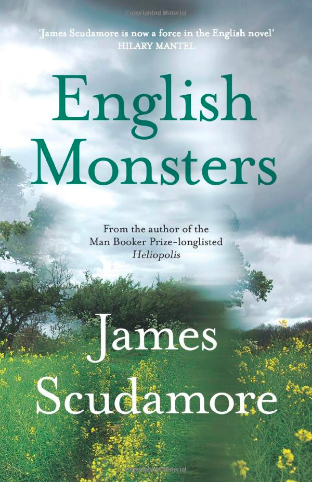Author:
James Scudamore
Reviewed by:
James Brooke-Smith

James Scudamore’s English Monsters is set during a very particular moment in the history of private education in Britain – the dog days of the rackety, poorly regulated prep school system in the 1980s.
Readers who attended such schools will no doubt recognise the self-enclosed world in which much of the story unfolds: the country location, the grand but crumbling architecture – “I saw it first at its most seductive. Battlements against a fierce blue sky. Honeyed stone in full summer light” – the Latin and Scripture lessons, and, perhaps most acutely, the sense of living in a time warp.
The novel’s narrator, Max, looks back on his schooldays with “the sense of being the last generation to experience a certain brand of Englishness”.
The novel traces the slow release of trauma that follows in the wake of the physical and sexual abuse endured by a group of boys at “the school on the hill”.
That the trauma plays out against the backdrop of successful careers in the tech industry and family holidays in Tuscan villas does nothing to diminish its impact. This is the milieu of what Nick Duffell has called the “wounded elite”; the psychological effects are what Joy Schiaverin has diagnosed as “boarding school syndrome”.
When the truth does come to light, the victims’ families are ill equipped to deal with their adult children’s suffering. They keep quiet out of deference to the good masters. They don’t want to make a fuss. They can’t see beyond their own distant and much embellished school memories.
When Max logs onto a survivors’ message board long after he has left school, he encounters the legions of “tally ho defenders and never-did-me-any-harmers” who cast doubt on testimonies of abuse.
English Monsters resonates powerfully in the context of recent news about historic cases of sexual abuse at Ampleforth, Caldicott and elsewhere.
Scudamore deftly sets the boys’ private grief against the changing texture of British society between the mid-1980s and the present day.
In his early twenties, Max spends most of 1997 living on a barge in Central London, playing casual gigs as a jazz pianist and pretending to study modern languages.
The novel captures the New Labour moment well, in particular the sense of Britain catching up with the modern, multi-cultural world and casting off its imperial heritage.
Shortly after election night, however, Max runs into some old classmates he hasn’t seen in years at a function at the Imperial War Museum, and we get a hint that the ghost of the past are not so easily laid to rest.
The portrait of Max’s grandfather is also beautifully done. Bob is the moral centre of the novel, a figure drawn with a mixture of tenderness and romanticism that makes him seem like a character from a Roald Dahl story.
Bibulous, profane, wily and kind, he manages to be deeply rooted in his local environment while never betraying a sense that he would want to exclude others from enjoying it.
He is a kind of genius loci who dwells deep in the Leicestershire countryside that surrounds the more enclosed and exclusive school. His advice to Max to “keep on speaking up, boy” is tragically defeated by the school’s punishing discipline and code of silence.
Scudamore adds to these motifs of good and bad tradition references to the changing mediascape that surrounds the boys as they mature: ZX Spectrums, Playstations, pagers, cell phones, techno music and eventually the digital start-up that makes some of them very rich.
When the abuse is finally made public and Eric “Weapons” Weathers-Davis, the sadistic ringleader, is sent to prison, the school dwindles and eventually closes.
But the derelict grounds lead a haunted afterlife, first as the setting for urban explorers in search of illicit thrills, and later as a simulated backdrop for a first-person shooter videogame – the “English Monsters” of the title – and an immersive theatre experience.
Scudamore allows us to hope that the scars of the past will gradually melt away as we enter a new kind of future.
The novel is written in a spare and crisp style. The dust jacket invokes Edward St. Aubyn and Donna Tartt, no doubt due to the theme of sexual abuse and the scholastic setting, but a more obvious influence is Kazuo Ishiguro.
The plot works via subtle hints that take on retrospective significance in a similar way to Remains of the Day or Never Let Me Go. One of Max’s school friends, Ishaq Jafari, even goes by the nickname “Ish,” which is what Ishiguro’s literary friends call him.
Ish also serves a vehicle for pointing out the casual racism of private school life in the 1980s: he confronts racist caricatures of his family as immigrant grocers by cornering the school market in smuggled porn mags and cigarettes.
But is the novel ultimately a little bit too poised to capture the reality of boarding school abuse?
There is a single occasion when Scudamore’s prose is disturbed by something more fragmentary and oblique. When the abuse is made public, Scudamore inter-cuts segments of a newspaper report (“The Monster on the Hill”) with a scene of the old friends getting drunk at a party.
This section veers away from Ishiguro’s limpid style towards something more reminiscent of David Peace, a writer whose jagged, collage-like fragments mimic the damaged psyches of his characters. Perhaps more dislocation and dissonance would have come closer to the heart of the matter.
But the novel still abounds with vivid details that conjure the secluded, time warp world of the school.
The anxious new boy who chews on the toggle of his duffel coat. The “distinctive aroma of urine and boot polish” that hangs in the corridors as the boys file into the dining hall. The “white-tiled communal trench” in which they bathe after rugby practice. The Stork margarine tub and long-handled jam spoon used to scoop up a terrified child’s vomit in the middle of the night.
English Monsters is a powerful draft of boarding school nostalgia that is laced with violence and pain. Such, such were the joys.
James Brooke-Smith is an associate professor of English literature at the University of Ottawa. He is the author of Gilded Youth: Privilege, Rebellion, and the British Public School (2019), an account of upper-class adolescence in Britain and the role of elite private education in shaping youth culture.



